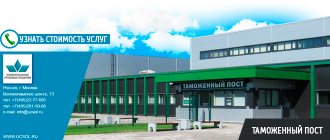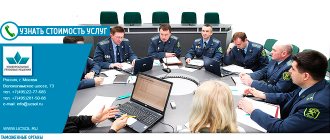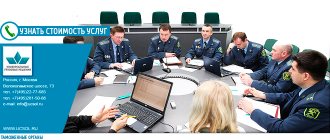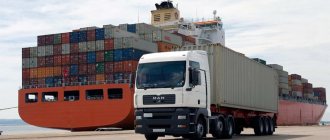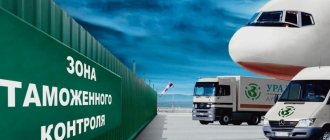Customs clearance
Any movement of goods and vehicles across the customs border of the Russian Federation entails the obligation to carry out procedures related to their customs clearance. Moreover, the import of goods and cars into the customs territory of the Russian Federation without the condition of its obligatory export is recognized as import, and, accordingly, the export of goods is recognized as export. In order to import or export goods, it is necessary to comply with established customs procedures related to its direct customs clearance and declaration. Without the skills and knowledge of customs legislation, carrying out such operations presents certain difficulties. Customs clearance and declaration of goods has the right to be carried out by both the declarant and a company that professionally carries out comprehensive customs clearance - a customs broker . In this case, the representative carries out all the necessary formalities on behalf of the declarant or other interested parties, on their instructions.
The stages of customs clearance of goods by the declarant involve the actual presentation of the goods being moved to the customs authority, their declaration and placement under the appropriate regime.
Customs clearance for imports includes comprehensive preparation of the necessary documentation and payment of customs duties, taxes and fees.
Provision of services by a customs broker
Specializing in the field of customs law and consulting, a customs broker will help carry out all the necessary operations to carry out all the necessary procedures and declare goods within the framework of the contract as efficiently as possible, at the lowest cost and in the shortest possible time. Thus, the services of a customs broker represent customs operations carried out by him on behalf of and on behalf of the customer (declarant) on a contractual basis. Experts in their field will help you competently organize the entire process of interaction with regulatory authorities and correctly and quickly prepare the necessary documentation for imported goods. In addition, professional representatives will help you get rid of unnecessary routine, presenting the freed up time to more important matters.
The cost of customs clearance of goods and services of a customs broker can be determined either as a percentage of the customs value of goods, or as a fixed amount for customs clearance of a certain batch of goods. It should be noted that the customs broker does not have the right to refuse the customer to conclude an agreement and carry out all the necessary operations; refusal is possible only on the condition that he does not have the opportunity to provide such a service or work. Therefore, the customs services provided by them are mandatory. The efficiency of foreign economic transactions is directly dependent on the speed and quality of customs clearance of goods. Being a professional in the field of customs, a customs broker will carry out all customs formalities with the best benefit-cost ratio within the framework of the customs services he provides. When choosing a declarant, preference should be given to an integrated approach to conducting foreign trade transactions, in terms of the customs services they provide. Undoubtedly, the most convenient form of cooperation is a single supplier of the entire range of operations provided when implementing an international contract, including transport logistics, legal registration of foreign trade transactions and customs clearance of cargo. Such a company must have capabilities in international logistics, transportation of all types of cargo and be a professional in the field of consulting for foreign economic activity (customs clearance, delivery, legal support). A company carrying out economic activities in foreign markets needs delivery and clearance of goods within a given time frame. Cargo transported across the Russian border is subject to taxes and duties; such movement is accompanied by filling out a large number of various documentation. To complete all formalities at customs, an appropriate license and the organization’s attachment to the customs terminal are required. All procedures are quite complex and entail significant risks, such as failure to meet delivery deadlines and liability. Therefore, transferring all these functions to professionals is more than reasonable. When assessing the list of customs services provided, one should take into account its ability to perform customs operations of any complexity at the customs offices required by the customer in Moscow, St. Petersburg and any other customs points in Russia. The presented site is an information resource about the activities of customs brokers and we do not provide customs services.
Tax advice is provided by experts from the Tax Planning website; support for the consulting section regarding documentation and accounting of import and export transactions is provided by specialists from the Accounting Services in Moscow website as part of the affiliate program.
FEATURES OF THE ACTIVITIES OF SPECIALIZED REGIONAL CUSTOMS DIRECTIONS
№17, 06.02.2019
Economic Sciences
Kudryavtsev Pavel Evgenievich
Rogaeva Elena Evgenevna
Key words: SPECIALIZED REGIONAL CUSTOMS DEPARTMENTS; SPECIALIZED ACTIVITIES OF CUSTOMS AUTHORITIES; INTERACTION WITH EXECUTIVE BODIES; SPECIALIZED REGIONAL CUSTOMS OFFICES; SPECIALIZED ACTIVITIES OF CUSTOMS AUTHORITIES; INTERACTION WITH EXECUTIVE AUTHORITIES.
Abstract: The article discusses the features of the functioning of regional customs departments operating in specialized areas. The article analyzes the directions and procedure for the activities of the Regional Operational Search Directorate, the Central Information and Technical Customs Directorate, the Central Forensic Customs Directorate, the Regional Customs Directorate for Radio-Electronic Security of Customs Infrastructure Facilities, and defines the role of the listed units in the system of customs authorities of Russia.
In the structure of the customs authorities of the Russian Federation, there are 4 basic elements: − Central Office of the Federal Customs Service (hereinafter referred to as the Central Office of the Federal Customs Service); − Regional customs departments (hereinafter referred to as RTU); − Customs; − Customs posts.
As is known, the main work of customs authorities in practical terms is mostly carried out by customs posts and customs houses, while regional customs departments and the Federal Customs Service are engaged in the administration of activities, management, as well as coordination and control within a specific region (which refers to the RTU) or the same definition of development strategy, development of customs policy and other more global functions (which relates to the Federal Customs Service).
RTUs are part of the centralized system of customs authorities of the Russian Federation. Their main job is to exercise control over the activities of customs offices, which are located exclusively in the region of activity of a particular customs department. Also in the system of customs authorities of the Russian Federation there are special RTUs, standing separately from the usual ones and called specialized: − Regional Operational Search Department (hereinafter referred to as ROPU); − Central Information and Technical Customs Administration (hereinafter referred to as CITTU); − Central Forensic Customs Administration (hereinafter referred to as CECTU); − Regional Customs Administration for Radioelectronic Security of Customs Infrastructure Facilities (hereinafter referred to as RTU EW OTI).
The regional operational-search department was established to carry out operational-search activities and carry out operational-search activities in order to identify, prevent, suppress and solve crimes, carry out urgent investigative actions and inquiries for which the criminal procedural legislation of the Russian Federation is assigned to the jurisdiction of customs authorities, identification and identifying the persons preparing, committing or committing them, as well as ensuring the Department’s own security [4].
The prerequisite for the creation of such an element in the structure of customs authorities was the increase in the number of crimes that jeopardized the economic security of the state (1990s). For this reason, reform was carried out in the field of customs, in particular customs control, and operational departments were established. The regional operational-search department is the modern embodiment of customs operational services.
ROPU differs from RTU not only in the specifics of its activities, but also in territorial jurisdiction, since the activities of ROPU extend to the entire territory of the Russian Federation[5].
The Department carries out its functions directly or through operational search services (hereinafter referred to as OPS) - branches of the Department located in the cities of St. Petersburg, Irkutsk, Rostov-on-Don, Pyatigorsk, Nizhny Novgorod, Yekaterinburg, Novosibirsk, Vladivostok.
The department carries out its activities in cooperation with territorial bodies of other federal executive authorities, executive authorities of constituent entities of the Russian Federation, local government bodies, legal entities and individuals, public associations and other organizations [4].
The next specialized RTU is the Regional Customs Department of Radio-Electronic Security and Customs Infrastructure Facilities, which carries out special activities on radio-electronic security (EW) of particularly important customs infrastructure facilities using special-purpose technical equipment under the direct supervision of the State Customs Committee of the Russian Federation[6].
Among the above, the activities of the Office include carrying out activities aimed at protecting state secrets, monitoring the effectiveness of information protection, as well as identifying electronic devices that are intended to secretly obtain information.
One of the features of the activities of RTU EW OTI is that currently technical means and electronic technologies are being improved at a rapid pace, and therefore work related to the analysis of the current situation in the field of modern technologies, as well as timely re-equipment, plays an important role, since The effectiveness of the Department's work largely depends on this.
Like ROPU, the Regional Customs Directorate of Electronic Security and Customs Infrastructure Facilities has branches called operational and technical services (OPS - branches of RTU EW OTI). They are located in different cities, namely: Kaliningrad, St. Petersburg, Rostov-on-Don, Nizhny Novgorod, Yekaterinburg, Novosibirsk, Irkutsk and Vladivostok.
The commissioning of these branches in 2009 on the basis of operational and technical units of customs authorities made it possible to fully implement the tasks assigned to the Department. In total, there are 20 operational and technical units within the customs, they are subordinate to the RTU EW OTI.
The Central Information and Technical Customs Administration (CITTU) is also part of the unified system of customs authorities of the Russian Federation. The main purpose of this department is to provide information to automated information systems (hereinafter referred to as AIS), support them programmatically, and also engage in their development [1].
Currently, a huge part of the work of customs authorities is carried out using special software. This may be the registration of customs declarations, making a decision on release or refusal to release automatically, preliminary information, the operation of a risk management system, and so on. It is also necessary to interact between the AIS of customs authorities and the information systems of other executive authorities, with the customs authorities of the member states of the Eurasian Economic Union (hereinafter referred to as the EAEU) and other interested parties[2].
In addition, it is of great importance to carry out work to ensure the uninterrupted and correct operation of automated information technology components.
The competence of this department also includes methodological management of the activities of the relevant divisions of customs authorities, ensuring information security and providing information services to government bodies and participants in foreign economic activity[3].
Thus, the activities of CITTU are extremely important, since they make it possible to use information and communication technologies throughout the entire customs system and at each of its four levels.
Another specialized regional customs department in the structure of the customs authorities of the Russian Federation is the Central Forensic Customs Department (CEKTU).
The activities of this department are carried out in various directions: − forensic science; − forensic forensics; − expert research; − scientific research; − scientific and methodological.
The structure of CEKTU includes more than 80 units of expert departments and departments that are engaged in expert research of goods of 97 groups of the Unified Commodity Nomenclature for Foreign Economic Activity of the Eurasian Economic Union (hereinafter referred to as the EAEU Commodity Nomenclature for Foreign Economic Activity)[7].
Territorial jurisdiction in CEKTU is determined by the region of activity of the RTU, and the direct activity of the Department’s employees is to conduct many examinations, such as: – merchandising (of goods, vehicles and industrial equipment); – materials science and identification examinations (of materials, substances and products); – forensic (technical examination of documents, handwriting, forensic examination, markings, weapons); – objects of intellectual property; – biological (objects of plant and animal origin); – industrial equipment; − technological (yield standards); − computer and technical, etc.
The most frequently performed examinations among all, according to statistics, are identification examinations[8].
So, in addition to expert activities, the Department is engaged in administrative work, that is, managing the work of departments and divisions, developing methodological recommendations, legal regulation, and so on.
Thus, each of the specialized regional customs departments has its own clearly defined specifics of activity and performs its own functions and tasks. Thus, the Central Information and Technical Customs Administration provides the ability for customs authorities to carry out customs operations using information and software tools of the UAIS of customs authorities, and the Central Forensic Customs Administration carries out examinations of objects (goods) of various nature and vehicles. The cooperation of customs officials and coordinated actions of all parts of the customs system ensures the coordinated work of customs authorities and contributes to the creation of digital technologies for customs regulation, administration and control, and the further development of the entire customs system.
